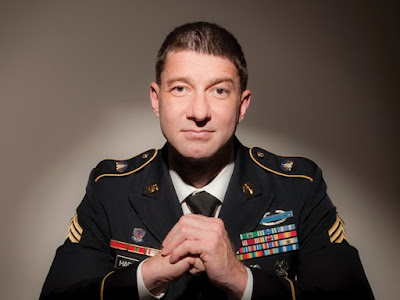By: Ranier Simons, ADAP Blog Guest Contributor
In the early years of the AIDS epidemic, fear and hysteria were founded on and fueled by paranoia of the unknown. Seroconversion predominately resulted in rapid onset of severe illnesses resulting in premature death. The lack of knowledge concerning modes of transmission, coupled with the stigma of what was then being labeled a predominantly ‘gay disease,’ resulted in multiple lanes of discrimination. Discrimination manifested in many forms of access denial, including housing, employment, and healthcare. In fact, HIV discrimination was specifically ‘codified’ in the military regulations.
 |
| Photo Source: Advocate |
The Pentagon began mandatory HIV screening for recruits in 1985.[2] Those with positive test results were turned away. Active-duty members who tested positive were allowed to continue to serve. However, the stigma around the assumption that they would get too sick to function productively meant demotion of duty and ostracism. HIV-positive service members were also prosecuted for sodomy and disobedience, and some were discharged without medical coverage.[2] Anecdotal evidence indicates some were segregated into separate barracks for HIV-positive troops.
Medical advancements in the treatment of HIV have drastically changed the trajectory of the disease since the 1980s. HIV is no longer a death sentence, and life-expectancy is almost on par with non-infected individuals.[2] Moreover, current antiviral medications reduce the viral load to undetectable levels where the possibility of transmission is effectively eliminated even through sexual contact, or has been termed 'undetectable equals untransmissible’ (U=U).[3]
Despite the current state of medical and scientific understanding of HIV, the military has yet to change its outdated policies. Employers are legally prohibited from discrimination against HIV-positive individuals on a federal level by the Americans with Disabilities Act of 1990.[4] There are other protections afforded under the Rehabilitation Act of 1973, as amended. Regardless, the military still maintains HIV discriminatory practices.
The Pentagon presently bans HIV-positive people from enlisting in armed services and prohibits HIV-positive people from being commissioned out of military academies. Additionally, the Pentagon had a policy of banning HIV-positive service members from deployment even with undetectable viral loads on active antiretroviral therapy.
The wheels of justice, however, seem poised to pump the brakes on the military's discriminatory policies. A federal district judge recently struck down part of the Defense Department’s current policy.
On April 6, 2022, in response to two different lawsuits, U.S. District Judge Leonie Brinkema ruled that U.S. service members can no longer be discharged or barred from becoming officers solely based on their positive HIV status.[4] Ra v. Austin and Roe & Woe v. Austin are two separate cases that were tried together. [4] In Harrison v. Austin, Sergeant Nick Harrison, who joined the military in 2000, sued the Army and the U.S. Department of Defense for denying his application to become a military lawyer with the JAG Corps due to his HIV status. He tested positive in 2012 after a tour of duty in Kuwait.[4]
 |
| Sergeant Nick Harrison; Photo Source: Metro Weekly |
In Roe & Voe v. Austin, the U.S Air Force attempted to discharge two active-duty airmen based on their HIV status. The discharge decision was based on a Trump-era policy of discharging service members who are undeployable for a period of 12 months. Since HIV-positive status barred the plaintiffs from deployment, they were subsequently undeployable for 12 months.[1]
Judge Brinkema’s ruling is a victory for the roughly two-thousand HIV-positive service members currently serving. This ruling also opens the door to future legal challenges involving the current policy preventing HIV-positive people from joining the military. Current military policy is not in line with current medical science and treatment innovation. Legal remedies to the detrimental results of outdated policy are sure to continue.
[1] Padgett, D. (2022, April 7). Landmark court victory: Military can’t boot people with HIV. Retrieved from https://www.hivplusmag.com/stigma/2022/4/07/landmark-court-victory-military-cant-boot-people-hiv
[2] Lalwani, N. (2021, July 22). The military's HIV policies are discriminatory and decades behind the times. Retrieved from https://www.washingtonpost.com/outlook/the-militarys-hiv-policies-are-discriminatory--and-decades-behind-the-times/2021/07/22/616fa480-e8c0-11eb-8950-d73b3e93ff7f_story.html
[3] RW Eisinger, CW Dieffenbach, AS Fauci. HIV viral load and transmissibility of HIV infection: undetectable equals untransmittable. Journal of the American Medical Association DOI: 10.1001/jama.2018.21167 (2019)
[4] Ryan, B. (2022, April 7). Judge strikes down military's limits on service members with HIV. Retrieved from https://www.nbcnews.com/nbc-out/out-news/judge-strikes-militarys-limits-service-members-hiv-rcna23513
Disclaimer: Guest blogs do not necessarily reflect the views of the ADAP Advocacy Association, but rather they provide a neutral platform whereby the author serves to promote open, honest discussion about public health-related issues and updates.

2 comments:
Military college student sues U.S. armed forces over HIV policy https://www.latimes.com/world-nation/story/2022-05-06/military-college-student-sues-armed-forces-hiv-policy
The military won't enlist people with HIV. A Revere man wants to change that https://wbur.fm/3sgss4K
Post a Comment